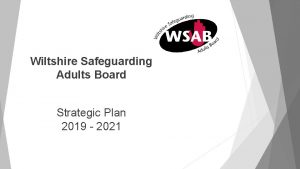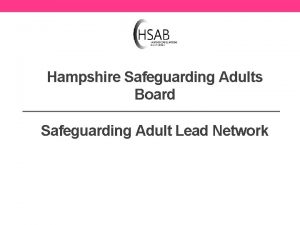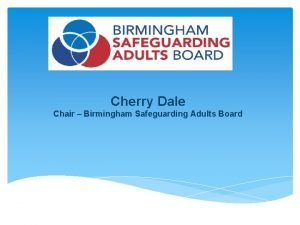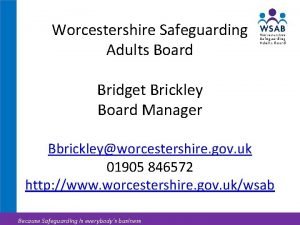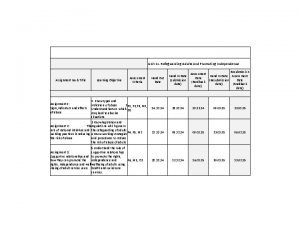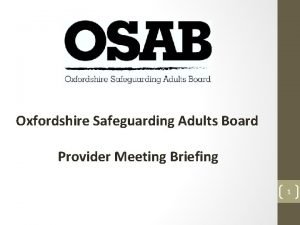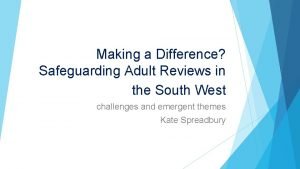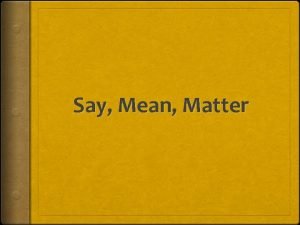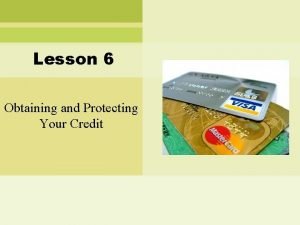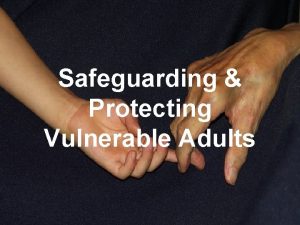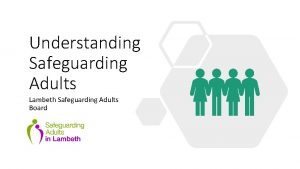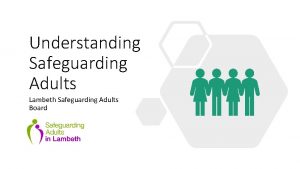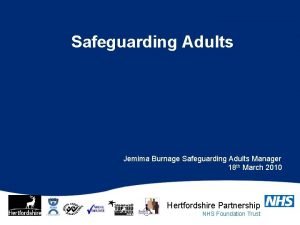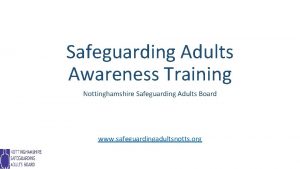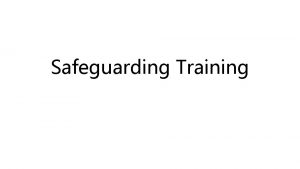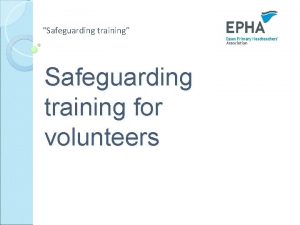Safeguarding Adults What does safeguarding adults mean Protecting











- Slides: 11

Safeguarding Adults

What does safeguarding adults mean? Protecting an adult’s right to live in safety and free from abuse and neglect People and organisations working together to prevent abuse or neglect Promoting the adult’s wellbeing Having regard to the adult’s views and wishes

Types of abuse *It can also include: Physical Abuse Female Genital Mutilation Sexual Abuse Criminal Exploitation Forced Marriage Neglect/Acts of Omission Modern Slavery Bullying/cyber bullying Discriminatory Abuse Human Trafficking Domestic Abuse Emotional/Psychological Abuse County Lines Organisational Abuse Misuse of medication e. g. over sedation Self-Neglect Financial Abuse Fraud and scams Sexual Exploitation Cuckooing Inappropriate or unlawful use of restraint Intimidation, coercion, harassment, use of threats Denying access to finances Abuse of power Coercive and controlling behaviour *This is not a full list

Recognising abuse *Signs to look out for: Unexplained injuries or inconsistent explanation of injuries from the adult or others e. g. carer Changes in the adult’s behaviour or mood e. g. becoming anxious or withdrawn Self-harm Unexplained weight loss Nervousness or fear when in the company of certain individuals e. g. a family member or a paid carer Another person always in the adult’s company – not letting the adult be alone or talk to others No access to finances, worrying about money or struggling to pay bills without a known reason or sudden/unexplained amounts of money/gifts Secrecy regarding their situation and/or whereabouts that was not present previously *There may be other things you notice where something does not feel quite right. These signs do not necessarily mean that the adult is being abused.

Real life examples names changed) (All Arnav has a learning disability and is financially abused by his paid carer Winston has autism. His flat is being used by a gang of drug dealers and he is too frightened to report it (cuckooing) Mary is blind and frail. Mary is regularly assaulted by her granddaughter when she refuses to give her money for drugs Abuse Stan has dementia and lives in a care home. He is regularly over sedated and left in bed all day with no stimulation Jatinder has multiple sclerosis. He is a victim of an online scam. He has paid over £ 30, 000 to the scammer in the last 6 months Sana aged 18 has mental health needs and is sexually exploited by her older boyfriend

Who abuses and neglects adults? Anyone can perpetrate abuse or neglect, including: Spouse/partner Other family member Neighbour Friend Stranger Professional(s) working with adults with care and support needs People in a Position of Trust Volunteer Acquaintance Any other person There can be more than one abuser

Where can abuse of adults occur? Abuse can occur anywhere, including: In the adult’s own home In someone else’s home In hospital In a care setting such as a day centre, supported living or a care home In a public place In a college or similar setting At work

Who may need support with safeguarding? Adults with care and support needs who are unable to protect themselves from abuse or neglect Care and support can be practical and/or emotional support for adults who need extra help to live their life in the best way they can. It can include people with a physical or sensory disability, or a long term illness. It can include people with mental health needs or a learning disability. It can also include carers.

Who should report abuse? Safeguarding is everyone's responsibility. Anyone can report abuse, including: The adult themselves Members of the public Family or friends Carers Neighbours or community groups People who work in shops or services, taxi drivers, hairdressers, dentists etc Trades people or visitors who may be visiting the adult’s home or a care setting People working in a professional capacity e. g. those with children or with adults who have care and support needs Emergency services Employers/employees Voluntary organisations Care providers Basically anyone who suspects abuse or neglect. If you feel something is not quite right, it is best to speak to someone about your concerns.

Contact us If you are a member of the public or a relative and you are concerned that an adult with care and support needs is being abused or neglected, or is at risk of abuse or neglect and wish to report your concerns you can call us on: 01902 551199 Monday – Thursday 9. 00 am – 5 pm, Friday 9. 00 am – 4. 30 pm Outside of the above hours including Bank Holidays for emergencies only: Call 01902 552999 If the danger is immediate, contact the emergency services on 999 If you are concerned about an adult and need advice or guidance you can telephone the Multi-Agency Safeguarding Hub (MASH) on 01902 554392 or 01902 554429 or email Adult. MASH@wolverhampton. gov. uk Wherever possible, speak to the adult you are calling about first to gain their consent including their views and wishes

More information For more information about safeguarding here in Wolverhampton, visit the Wolverhampton Safeguarding Together website: https: //www. wolverhamptonsafeguarding. org. uk/ Remember: Safeguarding is everyone’s responsibility.
 Wiltshire safeguarding adults
Wiltshire safeguarding adults West hampshire pes referral hub
West hampshire pes referral hub Birmingham safeguarding board
Birmingham safeguarding board Worcestershire safeguarding board
Worcestershire safeguarding board Unit 11 safeguarding adults and promoting independence
Unit 11 safeguarding adults and promoting independence Portsmouth safeguarding adults board
Portsmouth safeguarding adults board Oxfordshire safeguarding adults board
Oxfordshire safeguarding adults board Somerset safeguarding adults board
Somerset safeguarding adults board How to find absolute deviation
How to find absolute deviation What does mean mean
What does mean mean What is say mean matter
What is say mean matter Obtaining and protecting your credit vocabulary check
Obtaining and protecting your credit vocabulary check
